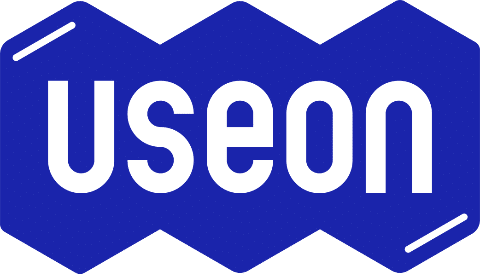Introduction
On June 5, 1972, the United Nations held the first Human Environment Conference and adopted the Declaration of the Human Environment. Since then, June 5th of each year has been designated as “World Environment Day.”
As a leading domestic provider of polymer material processing and solutions, USEON consistently practices the concept of sustainable development in its production and R&D processes. It is an active advocate and practitioner of environmental protection. Through a series of articles, we will comprehensively showcase USEON’s R&D and practices in green and sustainable development. Let’s embark on this green action journey together!
1. Foaming Extrusion: Technological Innovation and Green Practices
To overcome these challenges, USEON’s R&D team has invested a lot of effort. After continuous R&D and testing, they successfully developed the parallel twin-screw supercritical CO2 foaming process. This process design allows for precise control of the temperature and pressure of CO2, ensuring stable injection into polymers, achieving good dispersion, and optimal residence time distribution.
Temperature control is crucial in the foaming extrusion process. To this end, USEON designed a highly efficient cooling barrel structure, improving cooling efficiency by 80% compared to traditional structures. Additionally, to solve the issue of secondary machine leakage, USEON innovatively designed active melt sealing technology, making the tedious procedure of regularly replacing packing a thing of the past. These technological innovations not only enhance product reliability but also reflect USEON’s commitment to environmental protection, practicing sustainable development concepts in energy conservation, process simplification, and more. To date, USEON has helped global customers successfully put over 300 CO2 foamed XPS production lines into production.
These leading processing technologies and equipment can reduce societal carbon emissions by 100 million tons annually, with product quality and reliability widely recognized.

Persevering on the Long Journey
In the field of packaging materials, traditional EPS materials take centuries to degrade. To meet market and environmental demands, USEON, leveraging its technology accumulation in the foaming field and hundreds of experiments, successfully launched fully bio-based PLA (polylactic acid) degradable material molding foaming technology in 2023. Since PLA foaming beads are extruded by an extruder, its flexible production process allows for the addition of various functional additives to meet diverse customer requirements.
Compared to traditional EPS, EPP, and EPE materials, the EPLA produced by this technology exhibits superior performance, significantly reducing the carbon footprint, and can be completely degraded by microorganisms in nature into CO2 and water. PLA is a polyester made from renewable biomass such as corn, cassava, and sugarcane, and is recognized as an environmentally friendly material.
Currently, USEON holds multiple patents for this technology, offering customers a truly degradable plastic foam packaging material solution. For manufacturers of foam molded products, using USEON’s technology requires minimal equipment modifications to produce EPLA beads, which can replace EPS, EPP, etc., in packaging for appliances, food, electronics, luxury goods, and automotive lightweighting.
USEON is committed to creating value for customers and promoting its own green development, striving to become an innovative-driven provider of sustainable development solutions for polymer material extrusion equipment and related technologies.
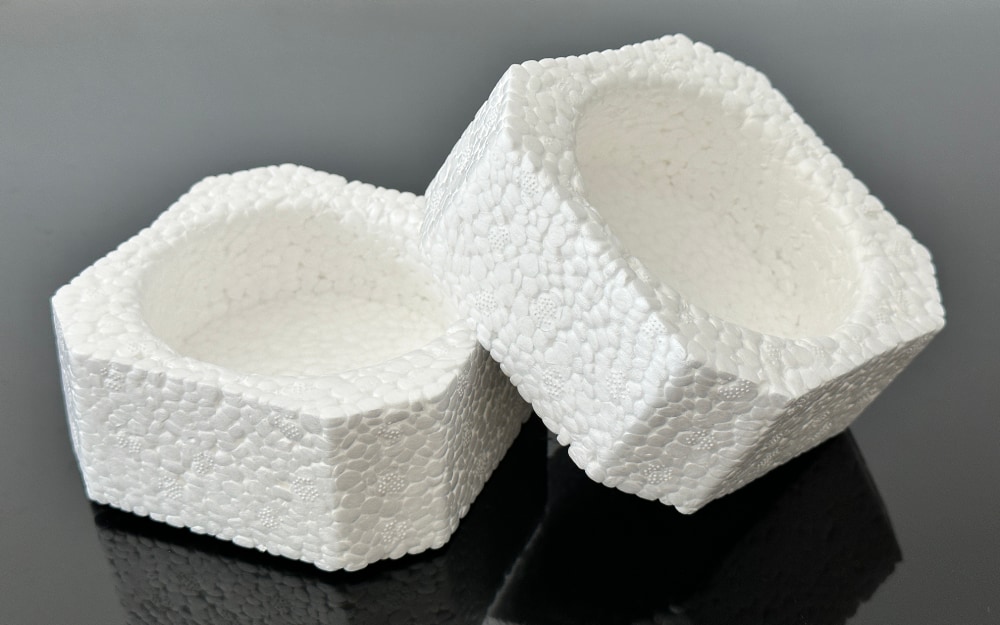
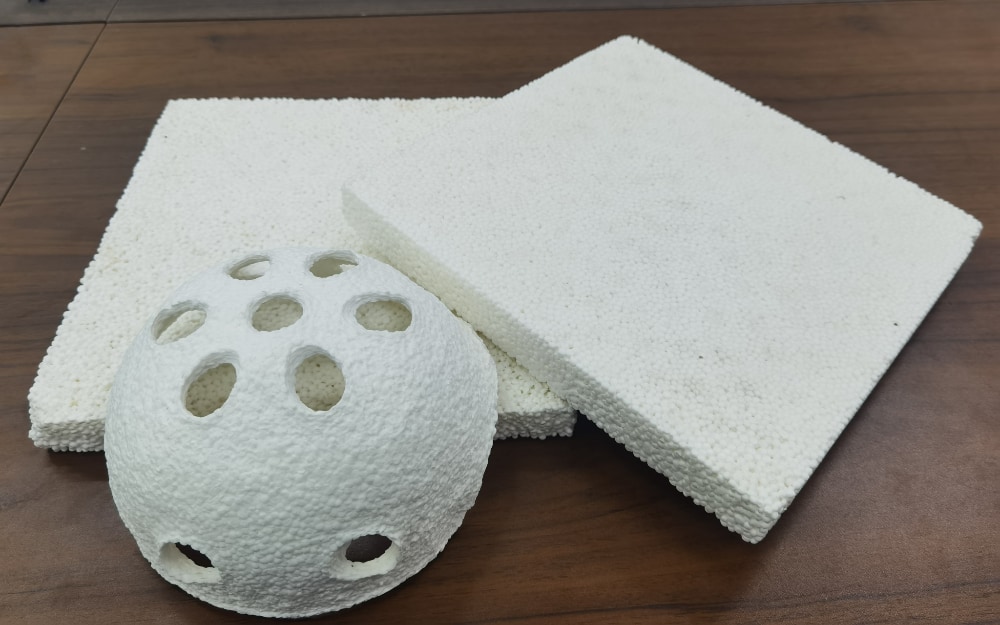
2. Recycling: Innovation Driving the Circular Economy
As we all know, plastics take hundreds of years to naturally degrade. According to statistics, of the plastic waste produced in the last 70 years, only 9% has been recycled. Dealing with the large amount of discarded plastic has become a major issue facing humanity.
Fortunately, most countries have already started taking action. Europe requires a 50% recycling rate for waste plastic packaging by 2025. Domestically, policies are actively guiding the healthy development of the plastic recycling industry. In 2021, China’s plastic waste recycling volume reached 19 million tons, with a recycling rate of 31%, 1.74 times the global average recycling rate for plastic waste. PET recycling accounts for approximately 33% of the total plastic waste recycling volume.
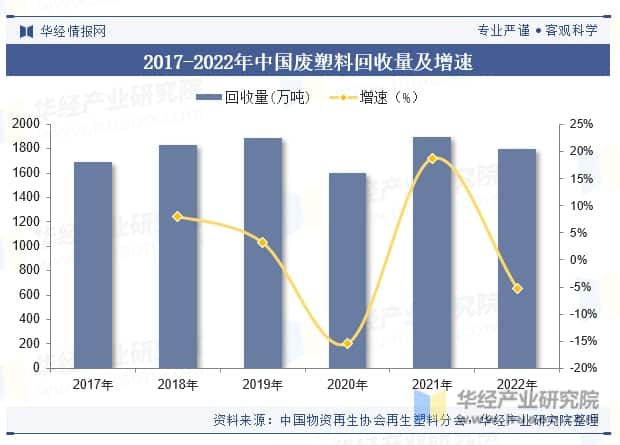
As a practitioner of sustainable development, USEON has been at the forefront of developing circular solutions for decades. Currently, USEON is the first domestic enterprise to recycle PET products using twin-screw and crystallization-free drying technology. Through extensive practice, the recycled new material maintains a viscosity reduction of ≤0.03 dl/g, achieving primary recycling of PET waste.
USEON has successfully helped global customers deploy 130 PET recycling granulation production lines, involving various PET recycling solutions such as bottle flakes, waste cloth, silk, film, and sheet recycling. The PET bottle-to-bottle technology can recycle 2 million tons of water bottles annually, saving 70 million kilowatt-hours of electricity.
Based on the circular economy and long-term technological accumulation, USEON has also made significant breakthroughs in EPS primary recycling, achieving EPS-to-EPS primary recycling technology. This involves feeding compressed and crushed EPS waste into a twin-screw extruder, injecting a foaming agent during the extrusion process, then cooling the material to a suitable temperature for underwater pelletizing. The newly produced EPS pellets have better performance than EPS new materials produced by traditional suspension methods.
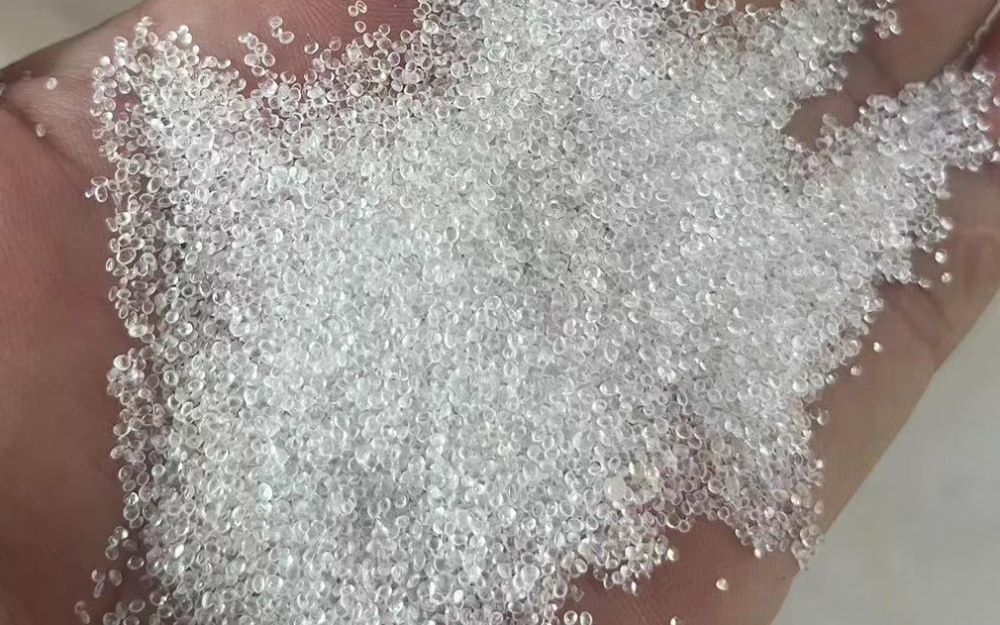
This innovative primary recycling technology not only meets higher international energy-saving standards but also significantly reduces the environmental impact of waste, saving resources, lowering costs, and minimizing waste as much as possible.
Currently, plastic has become an indispensable part of our daily lives, greatly enhancing convenience. However, the problem of plastic pollution is also becoming increasingly serious. USEON calls on the entire industry chain to actively address this challenge and jointly promote green recycling, allowing more plastics to be recycled. We are committed to providing high-quality products and services to global customers and creating a sustainable future together.
3. Twin-Screw Extruder: Advancing Quality and Sustainability
As a leading domestic manufacturer of twin-screw extruders, USEON continuously optimizes the performance of these machines through its deep process accumulation and international perspective, aiming to provide global customers with high-efficiency, high-quality, and low-energy twin-screw extrusion equipment.
SAT Series Twin-Screw Extruder
USEON’s SAT series twin extruder is a popular product among customers. This series features a powerful gearbox and precise screw elements, giving the SAT series a broader processing range and wider operational scope.
The SAT series also adopts a modular design, granting the equipment high flexibility in mixing and extrusion processes. It can easily switch between process modes according to different needs, including conveying, mixing, shearing, homogenizing, degreasing, and pressurizing. Additionally, the equipment allows for easy replacement of worn components, ensuring consistent product quality and sustainable production.
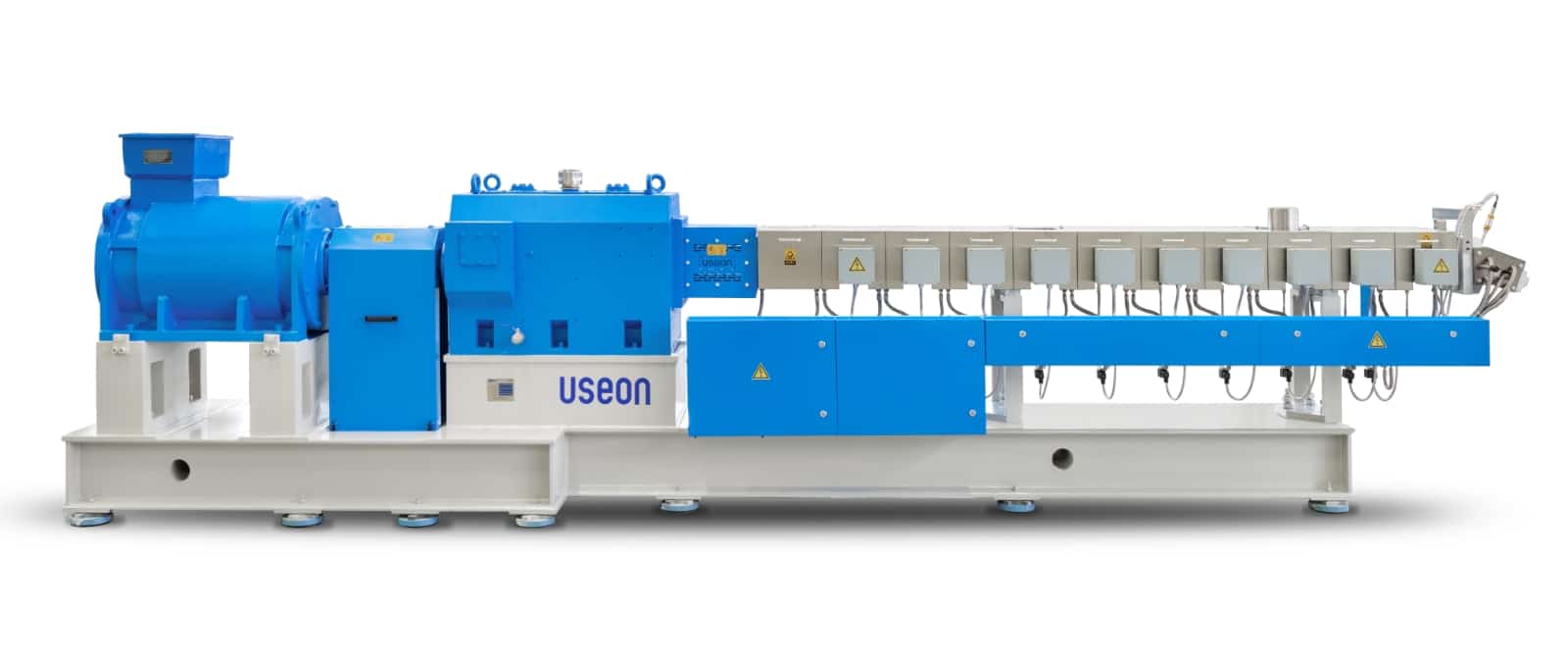
U+ Series Twin-Screw Extruder
U Series Twin Screw ExtruderThe U+ series is an advanced model of the SAT series, designed to meet higher production demands. This series boasts a high torque of up to 15Nm/cm³ and a high rotational speed of 1000rpm, suitable for high-speed and high-torque product requirements such as engineering plastics and masterbatches. Specifically designed for small to medium-sized blending modification production and applications, the U+ series can enhance production efficiency by up to 100% compared to the previous generation SAT models.
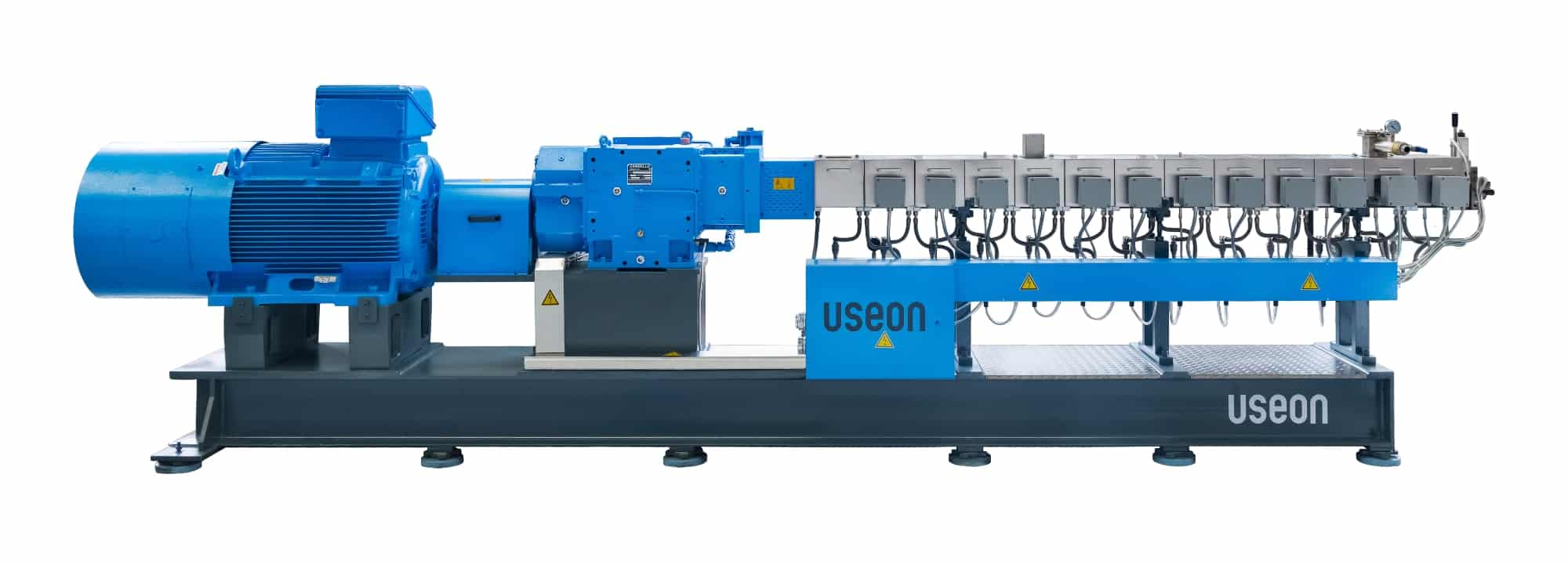
The U+ series also features an optimized heating and cooling system, achieving precise temperature control, which effectively reduces energy consumption and production costs, making operations more economical.
During production, the SAT and U+ series models utilize USEON’s intelligent control system to optimize production processes, ensuring efficient operation and optimal resource use. This reduces energy consumption and waste generation, thereby lowering production costs and environmental impact, achieving a win-win situation for economic benefits and environmental protection.
In the manufacturing process, USEON is committed to reducing energy consumption by using advanced manufacturing techniques, ensuring minimal environmental impact throughout the product lifecycle. USEON actively collaborates with international organizations, relevant associations, and business partners, incorporating various innovative ideas into product design and manufacturing.
Globally, USEON has implemented over 30 projects with the United Nations Industrial Development Organization (UNIDO) and the United Nations Development Programme (UNDP), saving a total of 30 million tons of carbon emissions, playing a significant role in reducing carbon footprints.
